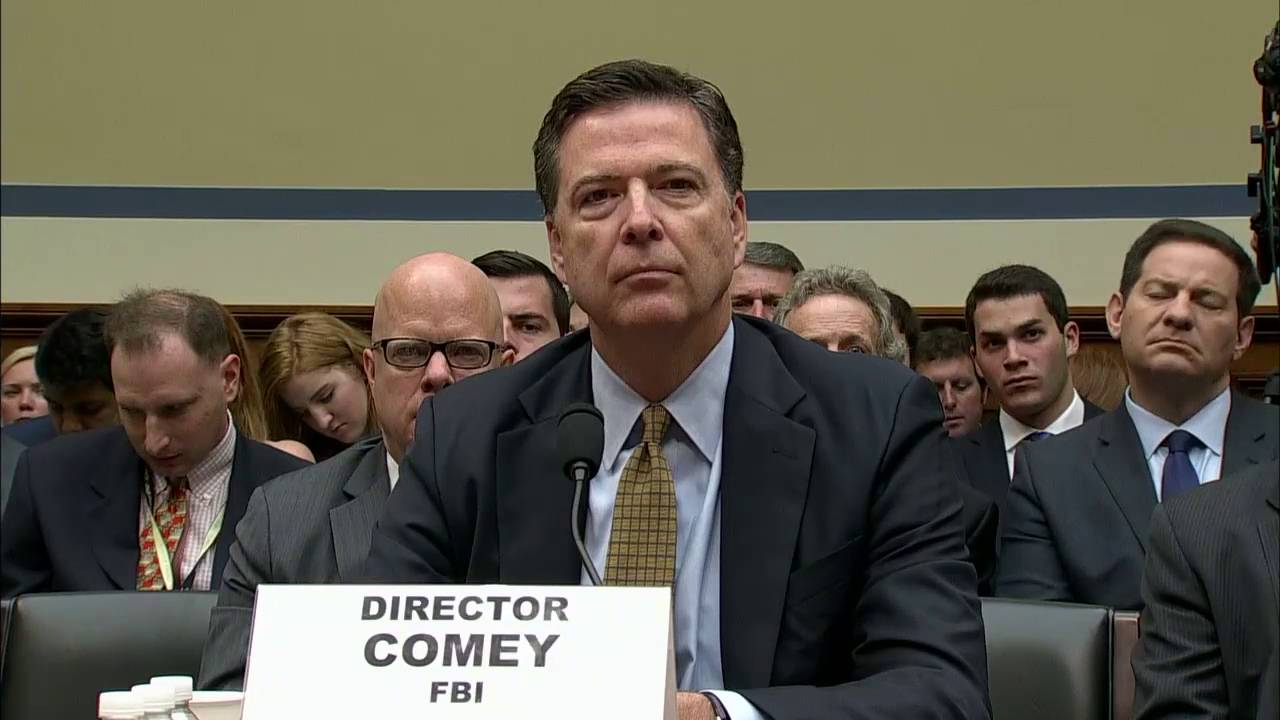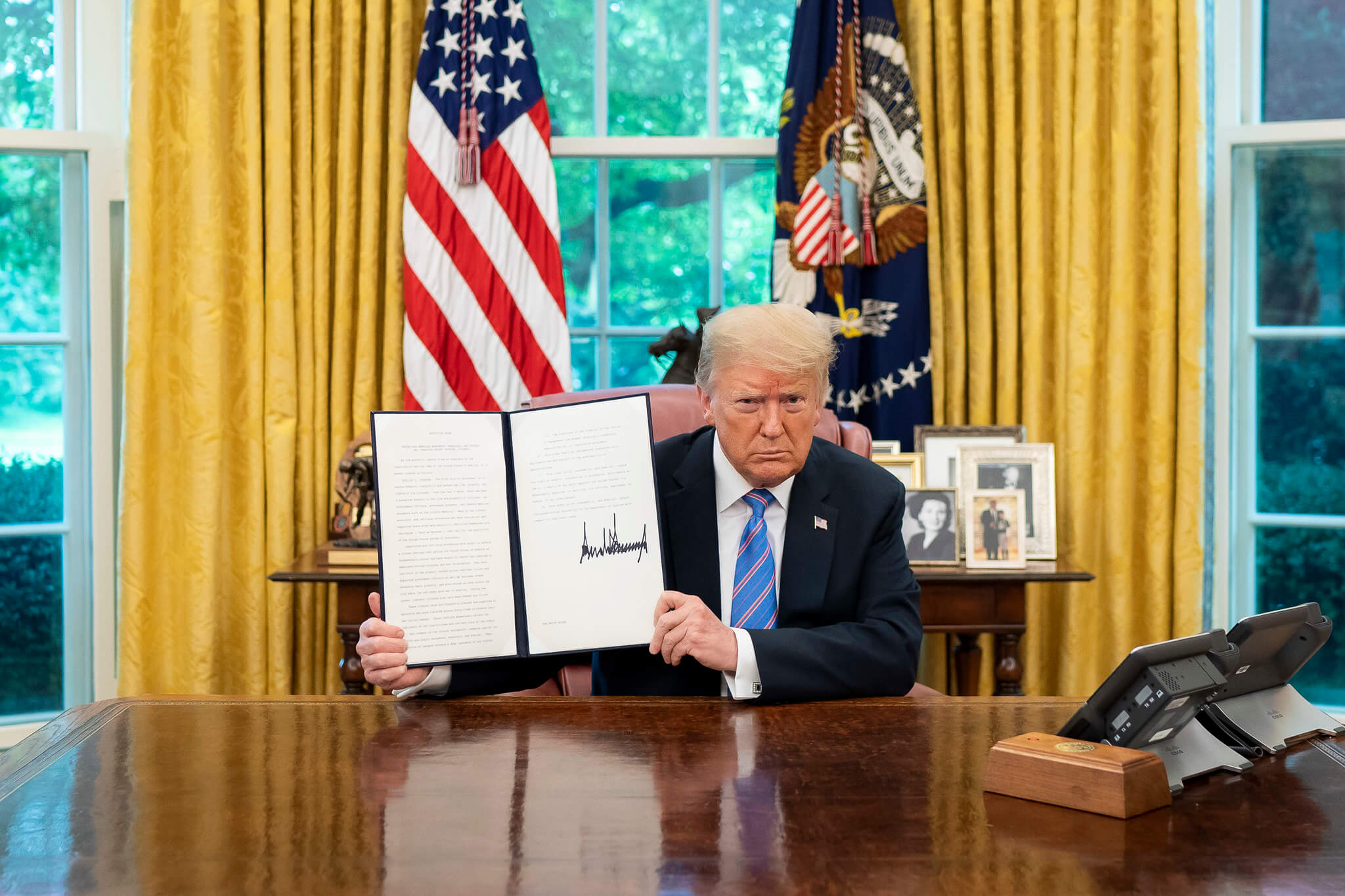The Nightmare Scenario: Trump Fires Comey, the One Man Who Would Stand Up to Him
Make no mistake: The firing of James Comey as FBI director is a stunning event. It is a profoundly dangerous thing—a move that puts the Trump-Russia investigation in immediate jeopardy and removes from the investigative hierarchy the one senior official whom President Trump did not appoint and one who is known to stand up to power. One of the biggest dangers of Comey’s firing is that Trump might actually get away with it, ironically, because of Comey’s unpopularity among Democrats and on the political left.
We warned about this danger immediately after the election.

Make no mistake: The firing of James Comey as FBI director is a stunning event. It is a profoundly dangerous thing—a move that puts the Trump-Russia investigation in immediate jeopardy and removes from the investigative hierarchy the one senior official whom President Trump did not appoint and one who is known to stand up to power. One of the biggest dangers of Comey’s firing is that Trump might actually get away with it, ironically, because of Comey’s unpopularity among Democrats and on the political left.
We warned about this danger immediately after the election.
On November 10, we wrote that that Trump’s firing of Comey would be a “a clear bellwether to both the national security and civil libertarian communities that things are going terribly wrong.” At the time we wrote those words, Comey was deeply unpopular with both the Left, which blamed Hillary Clinton’s defeat on his eleventh hour letter to Congress, and the Right, which criticized his decision to recommend that Clinton not be charged over her handling of government emails. Whatever the merit of Comey’s actions during the campaign, the fact that he managed to anger both sides of the political spectrum demonstrated his storied political independence. And that political independence, we argued, would serve as a critical check against any efforts on the part of President Trump to trample the rule of law.
The FBI Director serves a ten-year term precisely in order to insulate against the whims of a President who does not like what—or whom—the FBI is investigating. While the President has legal authority to fire an FBI director, the fact that Trump has done so under circumstances of an active FBI investigation of the President’s own campaign violates profoundly important norms of an independent, non-political FBI. The situation has no parallel with the only previous FBI director to be removed by a president: President Clinton’s firing of William Sessions, whose ethical misconduct was so extensive that it resulted in a six-month Justice Department investigation and a blistering 161-page report detailing his illicit activities, including flagrant misuse of public funds. Trump’s firing Comey at a time when Comey is investigating Russian intervention in the election on Trump’s behalf and the specific conduct of a number of people close to Trump undermines the credibility of his own presidency. And it deeply threatens the integrity of and public confidence in ongoing law enforcement and intelligence operations.
Trump’s offered rationale does nothing to assuage the fears we expressed in November regarding the meaning of this event.
In announcing Comey’s dismissal, the White House released a package of documents which included a statement from Press Secretary Sean Spicer and letters from President Trump, Attorney General Jeff Sessions, and Deputy Attorney General Rod Rosenstein. All four documents are available here.
The first three statements by Spicer, Trump, and Sessions all refer back to the final letter from Rosenstein, which articulates substantively the reasoning behind Comey’s dismissal. Spicer’s press release states that President Trump “acted based on the clear recommendations” of both Rosenstein and Sessions and that a search for a new FBI Director will start “immediately.” Likewise, Sessions’ letter refers the President to the memorandum by Rosenstein. Trump’s letter dismissing Comey, for its part, reiterates that he is acting on the recommendation of both Sessions and Rosenstein, declaring: “While I greatly appreciate you informing me, on three separate occasions, that I am not under investigation, I nevertheless concur with the judgment of the Department of Justice that you are not able to effectively lead the Bureau.”
Trump’s clumsy attempt to deny that his own conduct is at issue in the FBI’s inquiry is foolish. Comey testified just the other day that the FBI is “conducting an investigation to understand whether there was any coordination between the Russian efforts and anybody associated with the Trump campaign.” Splitting hairs over whether this does or does not mean that Trump is “under investigation” cannot obscure the fact that Trump just fired someone who is leading an investigation that deals with whether his aides, campaign, and White House staff had improper dealings with adversary foreign intelligence service.
Rosenstein’s memorandum bears the same date as the preceding three letters—which is to say today, May 9. Note that Rosenstein was only confirmed as Deputy Attorney General on April 25, making today his fourteenth day in office.
The memo, which reads like a bad op-ed, is entitled “Restoring Public Confidence in the FBI.” It begins by expressing concern that “the FBI’s reputation and credibility have suffered substantial damage” over the past year, citing Comey’s handling of the Clinton email investigation. Rosenstein criticizes Comey’s decision to make a public announcement in July 2016 declaring his conclusion that the investigation should be closed: Even if, as Comey has stated, Attorney General Loretta Lynch had a conflict with respect to the investigation because of her conversation on an airport tarmac with former President Bill Clinton, Comey should have followed normal Justice Department procedure rather than announcing his conclusion independently. Furthermore, Comey’s July press conference violated the Department’s principle against releasing information on the subject of a criminal investigation that has been closed without prosecution, Rosenstein’s memo says. Notably, Rosenstein does not appear to have waited for the conclusion of a DOJ Inspector General investigation into the matter.
Rosenstein describes Comey as having “supplant[ed] federal prosecutors and assume[d] command of the Justice Department,” declaring, “[T]he goal of a federal criminal investigation is not to announce our thoughts at a press conference.” (On this point, Ben and Jack Goldsmith actually wrote at the time expressing similar sentiments, but that was a lonely position when it happened.)
Rosenstein also notes Comey’s testimony last week before the Senate Judiciary Committee regarding his decision to release a letter to Congress containing further information about the investigation in October. While Comey framed the decision as a choice between “speaking” or “concealing,” Rosenstein writes that “silence is not concealment” in the context of a criminal investigation; rather, it is normal government procedure.
Rosenstein then runs through a list of former Attorneys General and Deputy Attorneys General who have publicly criticized Comey’s conduct, arguing that his poor assessment of Comey’s behavior reflects “the nearly unanimous opinions of former Department officials.” The list counts officials who served under both Republican and Democratic administrations and includes Judge Laurence Silberman, Jamie Gorelick (now the personal lawyer to Ivanka Trump), Larry Thompson, Michael Mukasey, Alberto Gonzalez, Eric Holder, and Donald Ayer.
On these grounds, Rosenstein writes that Comey must be removed in order to allow the FBI to regain the trust of the public and others in government following Comey’s breach of Justice Department norms.
We will leave for another day whether these are the real reasons Comey has been removed or whether they represent a convenient pretext. Notably, the New York Times’ Michael Schmidt reports that, according to administration officials, “Senior White House and Justice Department officials had been working on building a case against Mr. Comey since at least last week … Attorney General Jeff Sessions had been charged with coming up with reasons to fire him.”
Suffice it for now to remind readers that Trump was positively jubilant about Comey’s October letter at the time it was issued. “The FBI would never have reopened this case, at this time, unless it were a most egregious criminal offense,” he declared at a campaign event in Iowa. "As you know, I've had plenty of words about the FBI lately, but I give them great credit for having the courage to right this horrible wrong. Justice will prevail.”
We also do not recall Trump saying then that the letter represented some great breach of Justice Department norms and traditions or that the FBI director should be removed and replaced with someone “who understands the gravity of the mistakes and pledges never to repeat them.” Back in July, in fact, Trump’s only complaint about Comey’s behavior was that he had let Clinton off the hook. In a statement since removed from his campaign website, Trump blamed a “rigged system” for the FBI’s decision not to prosecute. He also tweeted:
FBI director said Crooked Hillary compromised our national security. No charges. Wow! #RiggedSystem
— Donald J. Trump (@realDonaldTrump) July 5, 2016
For months, this was Trump’s recurring mantra. In fact, just hours before the release of Comey's letter, Trump appeared on Fox News and claimed that the fact Clinton was “allowed to run for president” at all indicated that "[t]he FBI rolled over and the Department of Justice rolled over." Shortly after Comey’s letter was released, Trump praised the decision, saying that Comey had “brought back his reputation” by resisting pressure against prosecuting Clinton. He even went so far as to declare that, “What [Comey] did was the right thing.”
Attorney General Jeff Sessions apparently agreed—at least when there wasn’t a Russia investigation Comey was supervising that he had the power to stop. On October 30, following the release of the letter, he argued that Comey had an “absolute duty” to disclose new evidence in the Clinton email investigation prior to the election.
Even last week, the day before Comey testified in front of the Senate Judiciary Committee on his decision to release details of the investigation, Trump was lambasting the director on Twitter for his refusal to recommend criminal charges against Clinton:
FBI Director Comey was the best thing that ever happened to Hillary Clinton in that he gave her a free pass for many bad deeds! The phony...
— Donald J. Trump (@realDonaldTrump) May 3, 2017
...Trump/Russia story was an excuse used by the Democrats as justification for losing the election. Perhaps Trump just ran a great campaign?
— Donald J. Trump (@realDonaldTrump) May 3, 2017
We don’t doubt for a moment that many reasonable people object to what Comey did, nor even that there is merit to some of the criticisms—a matter Ben and Jack have discussed at length. But it’s a bit late now for Trump and his associates to suddenly discover the virtues of the regular order in Justice Department procedure, having campaigned so aggressively against it. After all, Trump had all of this information available throughout the course of his four months of presidency and indeed since before the election itself. It strains credulity that Trump has simply had an abrupt change of heart on the matter.
Removing Comey is also convenient, of course.
Getting rid of Comey removes the guy who is running the Russia investigation. It removes the guy who can look Congress in the eye and say credibly that the FBI is investigating whether anyone in the Trump orbit was actively working with the Russians. It removes the guy who, in February, reportedly refused the White House’s request to publicly knock down stories about Trump and Russia while congressmen in key positions of investigatory responsibility allegedly complied. It removes the one person of stature (figurative as well as literal) in the government whom everyone knows will—even when he’s wrong—do what he thinks is the right thing and damn the torpedos. It removes, in other words, the essential person for a credible investigation.
It’s a neat trick: stymie the Russia investigation by siding with Hillary Clinton. Put another way, what if you had a Saturday Night Massacre and liberals cheered because they hated Archibald Cox?
The question before us now is whether Trump will get away with it. There is no question that the President has the legal authority to remove the FBI director. But there’s also no question that removing the FBI Director in the midst of a high-stakes investigation of Russian influence in the inner circle of the President’s campaign and White House is a horrifying breach of every expectation we have of the relationship between the White House and federal law enforcement.
What’s more, there is also no question that members of Congress, particularly members of the Senate, who are concerned about the integrity of that investigation and, more broadly, about preventing the gross political intervention in ongoing law enforcement and intelligence operations have tools at their disposal. We expect them to use those tools, as every American should.
The immediate concern is to ensure that the integrity of the Russia investigation, and all associated investigations, is preserved. We have not previously called for a special prosecutor, believing that Rosenstein was a person of integrity who should be given a chance to make a call on that question. His performance today, however, requires that he now step aside. Assuming that he acted with sincerity for the reasons he articulated, he has still participated in a tawdry episode that will—and should—raise profound questions about the administration’s commitment to a fair and independent investigation of matters that touch the deepest of national security concerns. He cannot credibly lead this investigation any longer, and leaders of both parties must make sure he steps aside for an independent prosecutor who can.
The broader concern is the protection of the FBI. Because removing one FBI director means installing another. Whomever Trump chooses for the role needs to go through the most exacting scrutiny to make sure that the director’s office—and the Bureau more generally—is not now the subject of White House control and a mere instrument of political whim.
Jane Chong and Quinta Jurecic contributed to this piece.






